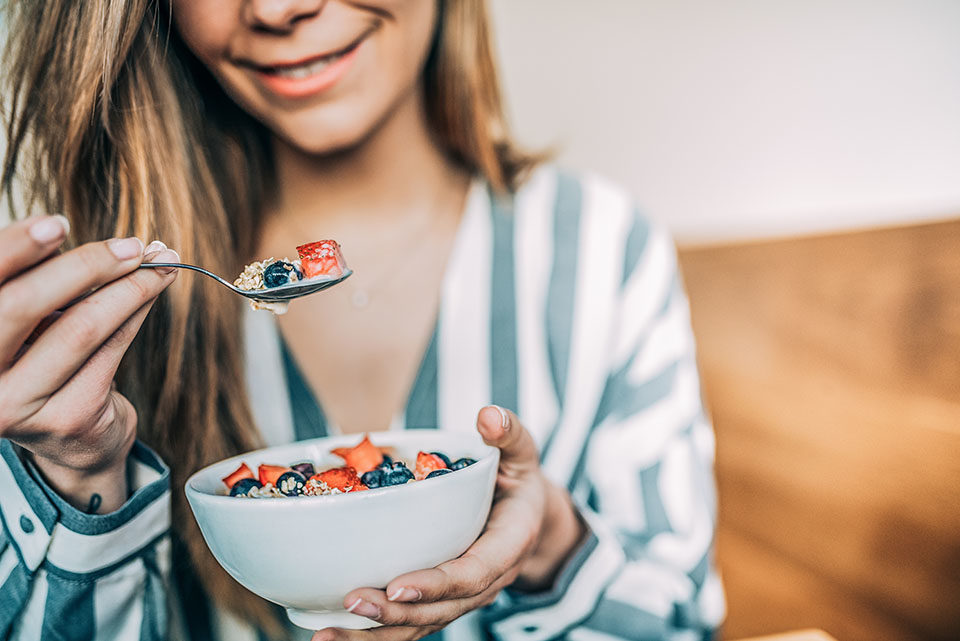CHICAGO — Companies could increase breakfast product sales by targeting items for each specific morning eating occasion, noticing which generations are impacted the most by price increases and “winning with breakfast,” according to a Feb 1 webinar from IRI, a Chicago-based market research firm.
An IRI survey last fall found 95% of US consumers said they eat morning foods, typically six days a week. Most consumers (59%) said they eat between 7-9 a.m., but the percentages were noteworthy for 5-7 a.m. at 32% and 9-10 a.m. at 28% as well.
“We found that consumers were eating multiple times throughout the morning,” said Sally Lyons Wyatt, executive vice president and practice leader for IRI. “It isn’t just I eat something once, and then I’m done.”
When asked to describe their morning eating/drinking occasion, 31% said mini or small breakfast, 23% said full breakfast, 21% said morning snack and 17% said morning fuel-up. While bacon and eggs might fit better with a full breakfast, yogurt might be considered a snack and a protein shake might be considered a fuel-up. Gen Z, millennials and older baby boomers/seniors were more likely to say they eat a full breakfast. Older millennials were more likely to say they eat a morning snack or a fuel-up.
IRI, while tracking social media, found baked foods have become a “fan favorite” in the mornings because their versatility makes them a fit for various morning options.
“They are able to take some of these baked goods and use them maybe to make a sandwich, or they are loving the fact that it’s sweet or it’s got their favorite flavor,” Wyatt said.
US retail bakery items sold in the perimeter of stores jumped 14% in dollar sales and 11% in unit sales for the 52-week period ended Dec. 26, 2021, when compared to the previous 52-week period, according to IRI. Center-store croissant sales were up 19% in dollar sales and 34% in unit sales.

Overall, US breakfast dollar retail sales for the 52-week period ended Dec. 26, 2021, were up 4% from the previous 52-week period. Price increases accounted for the gain as unit volume sales were down 1.1%.
The IRI survey last fall found 79% of consumers said they noticed food and beverage price increases. Amid the higher costs, 33% of consumers said they were reducing impulse purchasing. The percentages were higher for older millennials at 45%, Gen Z/ younger millennials at 38% and Gen X at 35%.
“It is the younger generation that also isn’t necessarily into their earning power years that is suffering the most and changing their ways a bit more than others,” Wyatt said.
Twenty-four percent of consumers said they were buying more private label/store brands, and 66% said there is little difference between name brands and store brands in breakfast food.
Premium items fare better on the weekend. Forty-four percent of consumers said they want something different at breakfast then, 33% said they were more likely to indulge on the weekend, 17% said they want a more special experience, and 14% said they want higher quality foods. Supermarket perimeter items like croissants and other baked foods are popular weekend items as are jams, jellies, syrup, honey and eggs. Fifty-two percent of consumers said they make breakfast from scratch on the weekends, which compared to 37% during the week.
“Weekends take on a slower pace,” Wyatt. “Because you have more time, you do a little bit more meal preparation.”
Some breakfast foods categories are faring better than others. Frozen breakfast food rang up gains of 11% in dollar sales and 4% in unit sales in the 52-week period ended Dec. 21. The ready-to-eat cereal category suffered declines of 7% in dollar sales, although sales were up 2% from two years ago, and 9% in unit sales. Milk sales were down 1% in dollar sales and 4% in unit sales. Refrigerated egg sales fell 4% in dollars and 10% in units.
“What can you do whether as a manufacturer or a retailer to help get the frequency of some of these categories up?” Wyatt asked. “Co-promotion is one. Obviously, some bundling is one.”

